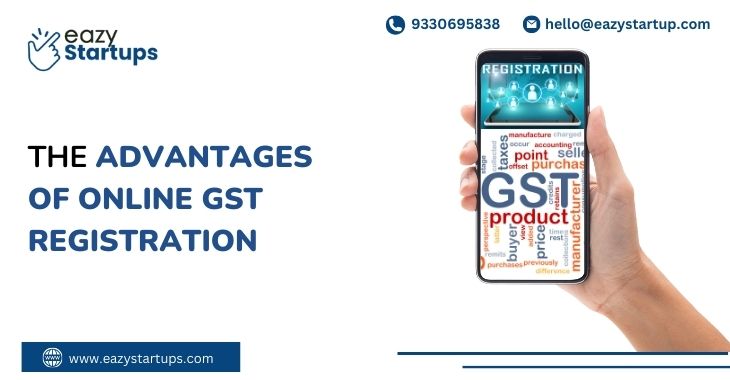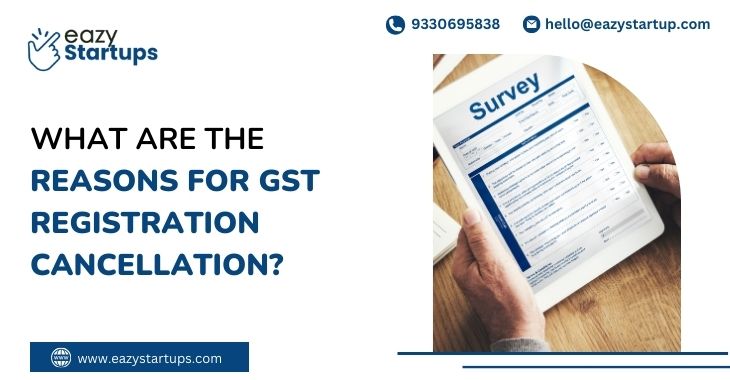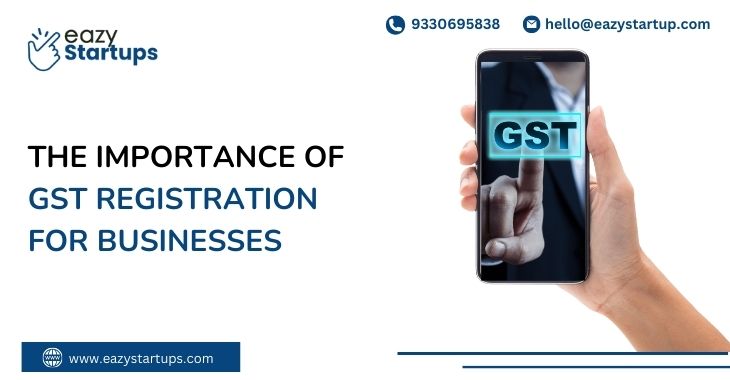Business owners may find navigating the tax landscape overwhelming, but thanks to contemporary technologies like online GST registration, it is now simpler and more effective. Online GST Registration in India allows you to leverage several important advantages. If you need expert help with the whole GST process to ensure a seamless experience, reach out to Eazy Startups today. You can avoid all complications with the assistance of specialists from Eazy Startups. This blog will discuss the important advantages of Online GST Registration.
Let’s have a look at the discussion:-
- Convenience
- Speed
- Accessibility
- Real-time Tracking
- Error Reduction
- Eco-Friendly
- Security
- Guidance and Support
Convenience:
One of the biggest advantages of online GST Registration is its simplicity. You can finish the registration procedure in its entirety without leaving the comforts of your home or place of business and without going to a tax office. Because you may handle the registration at any time of day and at your own pace, this saves a great deal of time and work.
Speed:
Online registration is substantially quicker than the conventional paper-based method. If all required paperwork is submitted via the GST portal, the registration procedure can be finished in a few days. With this swift turnaround, businesses may start complying with GST immediately and avoid waiting around for a lengthy time.
Accessibility:
You can register for registration whenever it’s convenient for you, thanks to the online GST site, which is open around the clock. It is very helpful for entrepreneurs who manage large daily operations and find it difficult to set aside time during regular business hours. The portal’s 24/7 accessibility guarantees that business owners can handle their tax requirements without interfering with their usual operations.
Real-time Tracking:
Another benefit of Online GST Registration is the ability to follow the progress of your application in real-time. By logging into the GST Portal at any moment, you can verify the status of your registration, identify any problems, and determine whether more paperwork is required. This openness makes it easier to schedule your business operations around the anticipated registration process completion date.
Error Reduction:
Filling out forms online reduces the likelihood of errors typically associated with manual entry. The online system checks for common errors as you fill out the application, prompting you to correct them before submission. It ensures accuracy and avoids delays in the registration process due to inaccuracies.
Eco-Friendly:
Compared to previous ways, Online GST Registration is more environmentally friendly. It is better for the environment because it lessens the demand for paper. It also lessens the need for paper documents to be transported physically, which helps lessen your carbon impact.
Security:
Online applications are safe because important business data is safeguarded by robust encryption techniques the GST portal uses. Because everything is filed electronically and kept safely in the system, you can rest easy knowing that your documents won’t be misplaced during transit.
Guidance and Support:
Users can navigate the registration process with guides and instructions from the online GST site. If they run into any problems, there are areas specifically for assistance, and they may reach support professionals via phone or email. It guarantees that assistance is easily accessible, facilitating the registration procedure and lowering the anxiety level of first-time registrants.
Final Note
There are many benefits associated with online GST Registration that can help business owners with the registration procedure. Because of its ease of use, effectiveness, and support infrastructure, you can concentrate more on managing your business and less on bureaucratic procedures. Adopting this cutting-edge strategy meets the demands of modern enterprises while saving time and offering a secure, user-friendly experience. As such a process involves many complications, get the assistance of specialists from Eazy Startups. Reach out to us today and make the registration process hassle-free and seamless.









Recent Comments